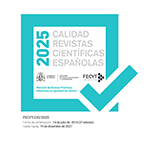Humour in interaction and cognitive linguistics: critical review and convergence of approaches
Abstract
Linguistic humour studies have been undertaken from different perspectives. The present paper offers a review of the most influential theories seeking synergies and convergence between them under the umbrella of cognitive linguistics, and, more specifically, resorting to Langacker’s (2001) current discourse space (CDS) as the overall framework which can accommodate and encompass those perspectives, along with Fauconnier and Turner’s (2003) Conceptual Integration Theory. A sketch of various theories is included (Raskin, 1985; Attardo, 1994; Coulson, 2005a; Veale, 2015, etc.), along with an analysis of points of convergence and similarities as the rationale for bringing them together against the backdrop of the CDS.
Downloads
Article download
License
In order to support the global exchange of knowledge, the journal Complutense Journal of English Studies is allowing unrestricted access to its content as from its publication in this electronic edition, and as such it is an open-access journal. The originals published in this journal are the property of the Complutense University of Madrid and any reproduction thereof in full or in part must cite the source. All content is distributed under a Creative Commons Attribution 4.0 use and distribution licence (CC BY 4.0). This circumstance must be expressly stated in these terms where necessary. You can view the summary and the complete legal text of the licence.









